As always, if you suddenly experience any of these symptoms after drinking alcohol, you should consult with a licensed medical practitioner for a proper diagnosis. Certain medications, like those that affect the nervous system, can potentially impact the reflexes, including sneezing. Consult your healthcare provider if you think your medications are causing any unusual effects. In most cases, sneezing when choking on food is a natural and protective response.
Other Compounds in Coffee That May Contribute to a Runny Nose
While the body naturally produces histamine, we also consume it through food and drinks that are rich in histamines, including cheese, wine, meats, fish, and fermented foods. Having a mild intolerance to alcohol or something else in alcoholic beverages might not require a trip to a doctor. It’s also possible that other factors, such as the temperature of the coffee, the amount of coffee consumed, and individual sensitivities, can contribute to the sneezing reaction. For example, drinking hot coffee can cause the nasal passages to become irritated, making you more prone to sneezing.
As with any food allergy, an allergic reaction to milk can occur within minutes of ingestion https://erahalati.com/vitamins-for-drinkers-essential-supplements-to/ and may last an entire day 2. Allergic reactions to food also result in skin rashes, itching, redness, swelling and tingling around the mouth. As with lactose intolerance, there are also cramps, diarrhea and nausea 1.

Why do I sneeze when I choke on food?
This is thought to be the reason why some people sneeze after drinking decaffeinated coffee as well. If you’re looking for a why do i sneeze when i drink beverage that still provides a caffeine boost without the sneezing reaction, you might consider trying yerba mate or guarana. These beverages contain caffeine, but they may be less likely to trigger sneezing due to their different chemical composition.
How to Diagnose a Coffee Allergy?
- Choking can elicit various reflexes such as coughing, gagging, or even vomiting, as your body tries to expel the foreign object.
- Those with existing heart conditions will also need to be careful before you drink alcohol in case alcohol intolerance could exacerbate their pre-existing conditions.
- It’s a multifaceted issue that signals how our bodies process substances differently.
- Symptoms of this type of reaction may include headaches, skin rash and nausea.
This article provides clarity by explaining the key differences between alcohol intolerance and alcohol allergy. A person may sneeze after eating due to allergies hidden in the environment causing what is called allergic rhintitis. You see, particles may float in the air that can cause allergic reactions. You might get sneezing attacks in an environment with dust, pollen, perfumes, detergents, smoke, and fur of pets. These “allergic triggers” may be what cause sneezing after eating sometimes.
Allergy to Rice Milk
Allergies occur when the body responds to an allergen (for example, an ingredient in beer). When this happens, your immune system overreacts because it sees the allergen as foreign. Your body creates antibodies to fight the allergen the way it would a pathogen.
If someone experiences these symptoms after consuming even small amounts of alcohol it is important to seek medical attention immediately. In most cases, alcohol-induced sneezing is harmless and not indicative of an underlying medical condition. However, if you consistently experience severe sneezing or other concerning symptoms, it is recommended to consult a healthcare professional. Often, people who are allergic to wheat are also allergic to barley, though that’s not always the case.
For example, I have a friend who loves beer but always feels sick after drinking it. These can amplify alcohol’s effects, making you feel more drowsy, dizzy, or out of sorts after just one glass. According to Dr. Daniel Hall-Flavin of the Mayo Clinic, “it’s best to avoid combining antidepressants and alcohol. It may worsen your symptoms, and it can be dangerous.” Beer allergies and intolerances are different—allergies are an immune response and intolerances are a digestive response. A skin test is the standard diagnostic tool for finding out if someone has allergies.
Some people also find that drinking coffee in moderation, such as limiting themselves to one or two cups per day, helps to reduce their symptoms. By taking a few simple steps, you can enjoy coffee while minimizing your symptoms and staying healthy. Although antihistamines are primarily for allergic reactions, some non-sedating ones like loratadine may help reduce sneezing even in non-allergic rhinitis. If you’re allergic to coffee, you may experience symptoms like hives, difficulty breathing, or swelling of the lips, face, or throat after consumption. Other symptoms include stomach upset, rapid heartbeat, or a sudden drop in blood pressure.
What Causes Morning Sneezing?
Non-allergic rhinitis can be triggered by various factors, such as weather changes, dust, fumes, and even certain medications. Pollen counts tend to be higher in the morning, leading to increased allergy symptoms for those affected by hay fever or other seasonal allergies. Also, sometimes a person may have a cold or Halfway house other illness that can cause them to sneeze after eating.
Barry loves experimenting with flavors, and he’s always coming up with innovative cocktail recipes. Quercetin is a plant pigment that has been shown to cause sneezing in some people. Therefore, sulfates are an important aspect of winemaking to ensure that the finished product is enjoyable to drink. Wine makers must carefully balance the use of sulfates with the acidity levels to create a pleasant flavor profile without compromising its shelf life. With the right balance, a winemaker can create a delicious and complex flavor profile that will surprise and delight even the most discriminating taster. His focus on coffee has led him to write extensively about the brewing, roasting, and tasting of this beloved beverage.

When you sip on your favorite drink, the body can react in unexpected ways, leading to a fit of sneezing. This reaction is particularly common when consuming alcohol, which can provoke nasal irritation and other bodily responses. The connection between alcohol and sneezing is intriguing, suggesting that our bodies might be more sensitive to certain ingredients within beverages than we realize.
